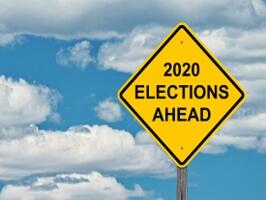Bloomberg vs. Trump, And the Winner Is…
Former New York City mayor Michael Bloomberg, a centrist Democrat, appears to be contemplating a 2020 presidential run, and he stands a chance against President Trump.

Former New York City mayor Michael Bloomberg, a centrist Democrat, appears to be contemplating a 2020 presidential run, and he stands a chance against President Trump.

Like many of the Democratic presidential wannabes, newly declared candidate Cory Booker has a name recognition problem. So voters aren’t giving him much of a chance at this point of going all the way.

Following a record-long government shutdown over an inability to reach an agreement on border wall spending, even more voters want to see Congress lean in to dealing with illegal immigration. However, they’re less confident these days that President Trump and the new Democratic majority in the House can work together to achieve that goal.

Despite the post-government shutdown delay, President Trump can still expect a big audience for his State of the Union speech tomorrow night.

In a year where the Democratic party swore in the most diverse, most female class in history, most voters see that trend continuing all the way to the White House.

President Trump told The New York Times this week that he has given up on negotiating with Congress over funding for a wall on the U.S.-Mexico border, but voters tend to think he will build the wall anyway.

Former Vice President Joe Biden remains the favorite candidate among Democrats to be the party’s 2020 presidential nominee. But as support for California Senator Kamala Harris rises, support for Bernie Sanders and Elizabeth Warren is fading.

It may not drive their politics, but most voters believe social media plays a role in dividing us.

California Senator Kamala Harris has announced her intention to run for president, but voters aren’t paying the California Democrat much heed.

Voters don’t expect Congress to fund President Trump’s border wall and think another federal government shutdown is likely on the way.

Most voters remain avid users of social media but say they’re not influenced by political posts on platforms like Twitter and Facebook. Those under 40 are far more likely than their elders to have their politics shaped by social media.

The United States, among other nations around the world, has chimed in on the contentious presidential race in Venezuela, but U.S. voters aren’t so sure we should be butting into the affairs of the South American nation.

Most voters still see America as a divided country and think President Trump is chiefly to blame.

Voters still think it’s easier to enter and stay in the United States illegally than it is in most other countries.

Representative Alexandria Ocasio-Cortez this week made comparisons to climate change being like a World War. Most voters disagree with that comparison, and even a plurality of Democrats don’t think it’s true.

The Supreme Court has allowed the Trump administration’s ban on transgender service members in the military to go into effect, and it continues to be a particularly divisive issue for Americans, especially along party lines.

Voters blame President Trump for the ongoing partial shutdown of the federal government and tend to oppose the compromise proposal he’s made to bring the shutdown to an end.

Despite Supreme Court Justice Ruth Bader Ginsburg's continuing medical issues and her unprecedented absence from the high court, voters aren’t convinced the 85-year-old jurist will step down in time for President Trump to name her replacement.

Republicans think President Trump should stand tall and deliver his State of the Union address despite the ongoing government shutdown. Democrats, however, think he should wait until after it ends.

Just after the 46th anniversary of the landmark abortion case Roe v. Wade, most voters are pro-choice and think the ruling is likely to stick for years to come.